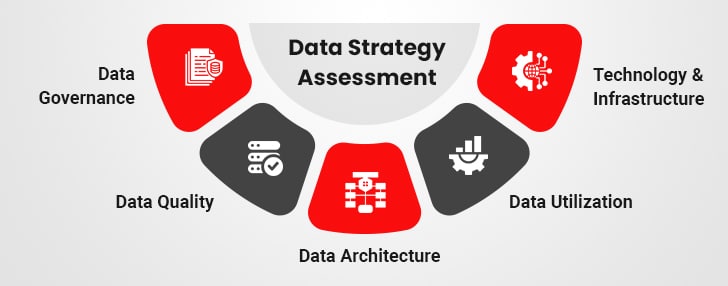Data growth is exponential in digital age and that’s why there’s a redoubled focus on effective data management. However, how enterprises can use petabytes of available data for business advantage remains a big challenge. Companies that use their data well can gain insights that lead to smarter decisions, enhanced customer experiences, and business growth. However, creating a successful data strategy involves more than just gathering data; it requires evaluating the current state of data management and analytics within the company.

This is where companies begin to need a well-thought of data strategy assessment. It helps organizations review their capabilities, find gaps, and align their data projects with business goals.
This blog will cover what a data strategy assessment is, why it matters, the steps to conduct one, and how it can support long-term success with data.
Table of Contents
The Data Problem You Can’t Ignore
What’s a Data Strategy Assessment, Anyway?
Core Components of a Strong Data Strategy Assessment
The Critical Role of Data Strategy Assessment
- Offers a Complete View of Data
- Encourages a Data-Driven Culture
- Identifies Weaknesses
- Improves Decision-Making
- Enhances Competitiveness
How to Know You’re in Trouble?
The Data Problem You Can’t Ignore
The harsh truth in most firms today is that your data is probably a mess. Poor data quality costs organizations an average of $12.9 million annually. Beyond immediate revenue loss, it complicates data systems and results in poor decisions over time.
Most businesses suffer from:
- Silos: Data present in different systems or departments that don’t communicate.
- Quality issues: Inaccurate, incomplete, or outdated data leading to bad insights.
- No strategy: Teams don’t know how to use available data to meet business goals.
According to the Data and AI Leadership Executive Survey, just 39.7% of organizations indicated that they treat data as a strategic enterprise asset. This leaves the remaining 60% merely investing in data tools, teams, and projects without a clear understanding of what is actually effective.
And let’s not forget the elephant in the room: missed opportunities. Every bit of unclean, inaccessible, or irrelevant data is a chance for your competitors to get ahead. Data isn’t just a precious resource—it’s a double-edged sword. Ignore it, and it hits your bottom line.
What’s a Data Strategy Assessment, Anyway?
Understanding your data is crucial for creating an effective strategy. A data assessment gives a comprehensive view of your organization, detailing your current data state, challenges, and a plan for a data strategy.
You need a full data assessment to build a solid data strategy. It identifies data sources, how data is shared across systems and teams, and how it can track progress against goals.
On a lighter note, a data strategy assessment is like taking stock of your fridge before a Thanksgiving dinner. What do you have? What’s expired? And what are you going to need to make things work?
It is a wide-ranging evaluation of an organization’s ability to produce insights and guide decisions from its data. Simply put, it’s about answering three questions:
- What data do you have?
- Is it useful, accurate, and secure?
- What do you need to fix to meet your goals?
So, it’s not just about organizing your data; it’s about determining whether it can clearly fulfil your business goals. Does your data help you make right decisions, or does it present a hindrance? A good assessment answers such questions and leads you to a plan.
Core Components of a Strong Data Strategy Assessment
A good data strategy assessment looks at five key areas—and if even one of these is shaky, the whole structure starts to tremble.
1. Data Governance
Who owns your data? Who’s responsible for ensuring its quality, security, and compliance? What quality standards exist to ensure data remain reliable and accurate? If you don’t have clear answers to such questions, you’re off the mark. Data governance is simply about accountability.
Poor governance is one of the biggest reasons for regulatory fines. For example, GDPR fines exceeded €1.2 billion in 2023 often because companies couldn’t prove they were managing data responsibly.
2. Data Quality
High-quality data is essential for accurate decision-making. Data is only as useful as it is accurate. Poor data quality hinders data literacy, costing organizations over $5 million annually, with 7% losing $25 million or more, according to Forrester’s 2023 Data Culture and Literacy Survey.
A strategy assessment identifies where these faults happen—whether it’s during entry, storage, or transfer—and creates relevant processes to prevent them.

Address Data Quality for Long-Term Business Growth.
3. Data Architecture
Your data architecture is like the plumbing in your house. If the pipes are old, leaky, or badly connected, you’re going to have problems. The same goes for your data systems. Are they integrated? Can they handle the scale and complexity of your operations?
A good assessment maps out your data flow and ensures it’s aligned with business needs. And no, “we’ll fix it later” isn’t a strategy.
4. Data Utilization
Using data means transforming raw numbers into actionable insights. Are you leveraging your data, or is it just idle? If you’re not using it to predict trends, improve customer experiences, or optimize operations, you’re missing out. PwC reports that data-driven companies are three times more likely to see significant decision-making improvements.
5. Technology and Infrastructure
Data needs the right tools and platforms to be able to support your company’s strategic goals. But here’s the catch: expensive software won’t solve anything if your underlying strategy is weak. A good data strategy assessment ensures your tech investments align with your actual needs, not just vendor pitches.
The Critical Role of Data Strategy Assessment
Businesses are fast understanding that success depends on effective use of data. Here’s why data strategy assessment really matters:
I. Offers a Complete View of Data: A data strategy assessment gives a detailed look at an organization’s data setup, evaluating data infrastructure, quality, and management processes. This helps identify gaps and inefficiencies, facilitating better data management and timely access to crucial information.
II. Encourages a Data-Driven Culture: By outlining strengths and weaknesses, this assessment establishes a culture that values data-based insights. It helps various teams understand how to use data more effectively every day, installing a data-first mindset in decision-making. According to Forrester, insights-driven businesses are 8.5 times more likely to see at least 20% revenue growth compared to those just starting out.
III. Identifies Weaknesses: The assessment detects issues in data infrastructure, such as data silos, poor quality, inefficient practices. Fixing these problems increases data accuracy, accessibility, and efficiency, leading to better use of data. It helps you fix vulnerabilities before they become front-page news.
IV. Improves Decision-Making: Ensuring data accuracy and consistency is essential for sound decision-making. A data assessment confirms that the data used for decisions is reliable and mapped to business needs.
V. Enhances Competitiveness: A good data strategy helps companies gain a competitive edge by making smarter decisions, meeting customer needs, and developing new products or services.
How to Know You’re in Trouble?
- Your reports don’t match across departments. Sales says one thing; finance says another.
- You can’t get basic metrics without jumping through hoops.
- Your team spends more time searching for data than analyzing it.
- New initiatives fail because the data to back them up isn’t there.
Recognize any of these? Then you already know you need help.
What Happens After a Data Strategy Assessment?
The right assessment always leaves you with a clear to-do list:
| Define Clear End Vision for Data |
|
| Simplify and Streamline Your Data Landscape |
|
| Optimize Data Integration and Flow |
|
| Enhance Data Quality and Consistency |
|
| Unlock Analytics and Advanced Insights |
|
Coca-Cola and Netflix are brands that implemented the right data strategies for success. Coca-Cola uses real-time data to refine marketing campaigns, while Netflix’s recommendation engine is a direct result of an advanced data strategy. These aren’t just big firms throwing money at a problem—they’re examples of what’s possible with a focused approach to data management.
The Damco Perspective
Damco’s Data Strategy Assessment service is crafted to audit your goals, review your current environment, and pinpoint the most impactful initiatives to pursue immediately, complete with a tactical implementation plan.
Through its Data & Visualization services, Damco transforms business data ecosystems into efficient, scalable workloads that generate actionable insights. What sets Damco apart includes:
- 800+ Person Years of Data & Visualization Experience
- 130+ Data Engineering & Visualization Consultants
- 205+ Successful Projects
- 20+ Technology Solutions
- 6+ Proprietary Frameworks & IPs
- Partnerships with Leading Cloud Providers like Microsoft, AWS, Google, and Databricks to deliver scalable, cutting-edge solutions.
- Proven frameworks to assess data maturity, define priorities, and ensure smooth implementation of data initiatives.
These differentiators highlight Damco’s expertise and commitment to delivering top-notch data strategy assessments and solutions.
Final Word
A comprehensive ‘data strategy assessment’ isn’t a one-time task. It’s an ongoing project critical for the success of your data initiatives. Regularly evaluate and refine your strategy to keep it in line with business goals. Start today: review current strategy, find areas for improvement, and commit to continuous growth. In the data world, standing still means falling behind.





